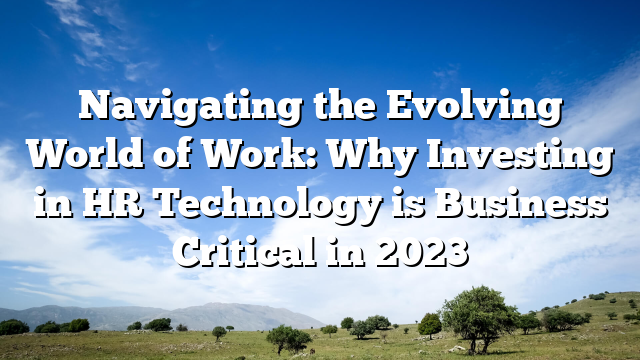The role of HR professionals has become increasingly important to risk management as a result of the rapid evolution that is occurring in the world of work in the context of a constantly shifting regulatory environment. In a recent survey conducted by the employee management platform Humaans, it was found that recent layoffs had a significant impact on HR and talent teams, with 59% of teams reporting reductions over the course of the previous 18 months. In addition, 61% of HR managers believe that their HR team is understaffed at the present time, while 54% believe that the role of the HR professional has grown more complex as they navigate an increasingly turbulent landscape with smaller teams and fewer resources.
76% of survey respondents indicated that they would like to invest in HR technology during the year 2023. This indicates that the purchase and implementation of HR technology has become a top priority for HR professionals. This should not come as a surprise given how important it is for human resources (HR) teams to have access to the appropriate tools in the current economic environment. A strong HR technology stack is essential to the expansion of a business because 55 percent of HR managers believe that they could reduce the amount of time spent on HR tasks if they had access to the appropriate tools.
A further finding of the survey was that only fifty percent of HR managers currently make use of tools that integrate with their primary HR information system. Roughly half of the respondents are in agreement that if they had the appropriate integrations within their HR technology stack, they would be able to drive value for their organization. 56% of businesses currently hold the belief that they can cut costs and save time by implementing an effective integration strategy.
In the modern-day world of commerce, the significance of ensuring the safety of one’s data cannot be overstated. As a result of the increased frequency with which cybersecurity attacks are carried out, HR leaders are becoming increasingly concerned about the safety of their organization’s personnel files. Despite this, the results of the survey showed that the majority of HR managers (61%) believe that the data security of their HR technology has room for improvement. This demonstrates how important it is for HR departments to make investments in HR technology that includes stringent data protection protocols.
HR leaders now play “a meaningful role in helping their organizations navigate the downturn and mitigate the risks and impact it may have on their people,” as noted by Giovanni Luperti, CEO and cofounder of Humaans. However, their teams are understaffed, and many of their tools aren’t suitable for the tasks at hand. Due to the fact that HR professionals are expected to navigate the rapidly changing world of work with reduced budgets and smaller teams in 2023, investing in HR technology has become an increasingly essential component of doing business.
In conclusion, the findings of the Humaans survey emphasize how critical it will be in 2023 to make investments in advanced HR technology stacks. The tools that HR departments use need to be purpose-built, offer robust data security precautions, and be able to integrate with their primary HR information system. The appropriate human resource management technology can help HR professionals save time on HR tasks, drive business growth, and mitigate risks and impacts on their people in the midst of a landscape that is becoming increasingly turbulent.
In the second half of 2023, businesses will likely continue to implement cost-cutting measures such as layoffs, hiring freezes, and budget cuts. As a result, human resources professionals will need to be equipped with the appropriate tools to assist their organizations in navigating the downturn. The advent of remote work has led to an increase in the frequency of cyberattacks, which has led HR executives to place an increased emphasis on the protection of their organizations’ sensitive data.
Investing in HR technology is not only a way for HR professionals to improve their efficiency, save time and money, but it is also a way for businesses to reduce risks and ensure compliance with regulations. These are all benefits that accrue to the HR department. Since recent layoffs have had a significant impact on HR and talent teams, it is becoming increasingly important for businesses to make investments in the appropriate HR technology stack in 2023.
In conclusion, human resources professionals have an obligation to prioritize the investment in a robust HR technology stack that integrates with their primary HR system, provides data security measures, and is suitable for the intended use. This will help them succeed in successfully navigating the rapidly evolving world of work, mitigate risks and impacts on their people, and drive business growth in the midst of an increasingly turbulent landscape.

Darren Trumbler is a versatile content writer specializing in B2B technology, marketing strategies, and wellness. With a knack for breaking down complex topics into engaging, easy-to-understand narratives, Darren helps businesses communicate effectively with their audiences.
Over the years, Darren has crafted high-impact content for diverse industries, from tech startups to established enterprises, focusing on thought leadership articles, blog posts, and marketing collateral that drive results. Beyond his professional expertise, he is passionate about wellness and enjoys writing about strategies for achieving balance in work and life.
When he’s not creating compelling content, Darren can be found exploring the latest tech innovations, reading up on marketing trends, or advocating for a healthier lifestyle.
